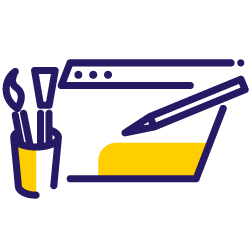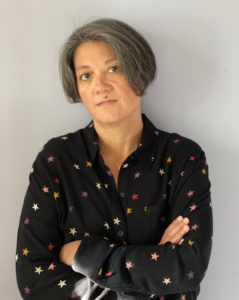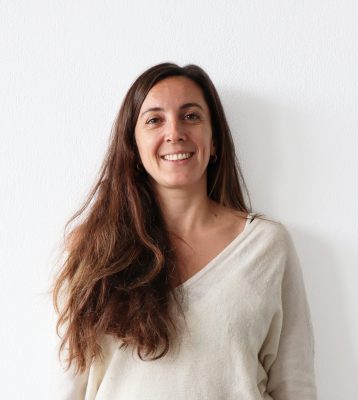We spoke with Virginie Clève, digital marketing and strategy expert at Largow, as part of our project to share what Oncrawl users are doing in SEO in their day-to-day jobs.
Virginie Clève, an early SEO expert
“I stumbled into SEO out of necessity, when I wanted to reference my first website in 1999.”
With over 20 years of experience in the industry, she has a very strong command of SEO and digital marketing. However, the beginning of her career is quite atypical and her introduction to SEO was a bit by happenstance.
Oncrawl: How did you get started in SEO given your rather unique background?
Virginie: I studied literature and the career path that was opening up before me was that of a museum curator. I quickly realized that there were very few positions available, it would take years to pass the exam, and there was even the risk of never passing. Moreover, I wondered if I really wanted a career that changed so little… Then, during a dinner party, a friend of mine started talking to me about a brand new thing: the Internet. He suggested I try something in this field. As I was running out of ideas about my career focus, I used the content I had for a university assignment to create my very first site. And that’s how I got started.
Understanding SEO and digital marketing in all sectors
After several years doing in-house SEO, Virginie now heads her own business where she develops digital strategies for e-commerce, cultural and media websites.
Oncrawl: What is the nature of your current role?
Virginie: Let me start by specifying that I do not run an SEO agency. I work on various projects such as developing social media as well as global digital strategies and product design. SEO represents at most about 30 to 40% of my work. In fact, I’ve never been just an SEO, I’ve always been a project manager.
When I started, my objective was not to do SEO but rather to reference a site I had created. I’ve always worn multiple hats, first as a project manager, then in product management and marketing, with a bit of SEO on the side. About 8 years ago, I created my own agency and I maintained the same scope: digital strategy, in the broadest sense of the word, with some operational work on certain areas of expertise, of which SEO is one.
Oncrawl: You have worked for several media sites. Can you tell us more about those experiences?
Virginie: Yes, I’ve worked several years in the media industry: at Prisma Media, then at Figaro and also at Radio France. Over time, I moved up to management positions where I managed the product and marketing as a whole.
A real particularity of media sites, specifically in regards to SEO, is the volume of content. In SEO, often the problem is that we don’t have enough content. With media sites, it’s the exact opposite, we have too much content! The sites are huge, sometimes consisting of millions of URLs.
This is where Oncrawl’s tools are particularly interesting for me. I use a lot of segmentation by year of publication to see what content is still active and what percentage of it is by year of publication. With this ability to do segmentation, we have the opportunity to do some pretty detailed analysis and not just apply generic SEO rules. I use Oncrawl for all my current SEO clients, and particularly for media sites, to run the crawl-over-crawl. These are sites that evolve a lot and quickly, so it’s very important to see what has changed from one crawl to the next. Log analysis is also extremely important for this kind of site.
Oncrawl: Is there a project you have worked on of which you are particularly proud?
Virginie: The project I’m most proud of is the Eiffel Tower website, because it’s the result of work done in a spirit of total trust. The Marketing Director, Stéphanie Renault, called me even before the conception of her site, so I was able to participate in all phases of development. The result: the site’s audience was multiplied by 3.5. I never imagined that we could achieve such tremendous growth.
Furthermore, it was absolutely fascinating to work on a site that is very small, volume wise, compared to those I am used to working with; it’s a site with less than a thousand pages. But it gets a lot of traffic. It’s also a site on which I did some “haute couture”, meaning that we worked page by page to do some real fine tuning.
We continue to collaborate in total harmony. I work with them as if I were part of the team. There is not this rigid client/supplier relationship that you can sometimes find when you are an external agency, and all the site’s changes are thought out together.
The keys to technical SEO from an expert’s point of view
“Back when I first started doing SEO, I learned the basics of building a site, which by the way still hold up: good content, good architecture, sound reflection, and most importantly, no tricks.”
Oncrawl: Are there themes that come up more often than others with your clients?
Virginie: Since the pandemic, short-term SEO projects have disappeared. I see this as a fundamental change. We have moved towards much more in-depth work. There is a strong desire to build for the future, so the time and the means are made available. There are also a lot of website redesigns that modify the information architecture, potentially with UX support, and there is also much more anticipation than before. With my clients, we also work a lot on Google Discover, for which I have a rare niche of expertise.
[Case Study] Evolving SEO needs: from start-up to unicorn
Oncrawl: What is the most challenging and/or complex aspect for you when it comes to Technical SEO?
Virginie: The most complicated thing for me is when you are faced with developers who have never done SEO or who have never faced SEO problems during their careers. In order for them to learn how to do it, they need rapid skill development. Some are interested in learning, but others, not at all. It becomes even more complicated when you are on a redesign project where the timing is quite tight, so you have to manage to get people on board in a different way.
SEO requires you to constantly stay on top of what you know about the industry and its practices; therefore, you have to monitor daily industry updates and changes and that represents a significant portion of my time: at least 1h to 1h30 per day for me. Additionally, the ever increasing technical complexity is also a challenge. In some cases, we find ourselves almost doing web development as it is the case for web performance, full JS techno and system administration, which are not really a part of our job. Even if I have a technical background, I’m not a developper. But if we want the projects to move forward, we have to manage that too.
Oncrawl: What do you when you have SEO clients who expect results on a deadline? How do you explain that SEO is not quite that straightforward?
Virginie: There are three levers that I rely on: honesty, evangelism and data analysis.
First, honesty: always tell the truth. I always operate on the principle that if I don’t know something, I’ll say so. In such a changing world, I believe that transparency and candor are the keys to trust.
Then, the analysis. It’s important that we show what we have analyzed in the clearest and most visual way possible. We illustrate and we explain why we don’t yet see any results.
Often, we know why we have dropped in the rankings, but we don’t always know how we are going to move back up and especially when, because Google’s algorithms are increasingly more difficult to decipher.
Finally, there has to be a lot of evangelization and it should be done from the very beginning of the project, especially when everything is going well. Explaining how SEO works and Google’s main guidelines are essential. It is necessary to transfer the maximum amount of knowledge and skill. The more competent the client is, the better the results will be. It’s not a risk for an agency to have its client trained in SEO: it’s actually an opportunity to go even further.
With my long-term clients, I’ve been known to tell them that when their audience drops, they just need to wait and that I don’t know exactly when it’s going to come back up, but that I do know we’ll get there. We’ve done the work and we’ve done it well, so after a while we get there and at that moment, the trust is fully established.
The future of SEO
SEO is an industry that never stops evolving and it requires continuous learning. Virginie has some ideas about what’s to come in the near future.
Oncrawl: In your opinion, what will be the main challenges for tomorrow’s SEOs?
Virginie: For the younger generations coming out of school, there is a lot of knowledge to acquire in order to do SEO: from product management, to marketing, to project management, to system administration, to web development, to UX, to data. It seems as though you almost have to be a web analyst and also understand the real job of pure SEO. They will often be in front of developers who expect them to be well versed in web development, or working with marketers who expect them to speak their language, or dealing with product managers who need them to be integrated in the product design flow. In the future, I think this will be the primary challenge for SEOs: having to be multi-faceted.
Oncrawl: If there was one area of SEO that you could choose to work on in more depth, what would it be?
Virginie: Cross-referencing data! I think it’s very important to mix as much log and crawl data as possible with other external data related to conversion, revenue, pages per visit, time spent etc. to make SEO profitable. In fact, when I started out, I was doing SEO by the pound, the goal was to get visits and page views. It seems to me that now, we are finally moving to the next step.
Let’s take a media site for example: one of my problems is to try to drive SEO visits to the pages that will turn visits into subscriptions. What is going to allow us to drive that traffic (in relation to the theme, the type of content, its length, etc.) to those pages that we will subsequently transform visitors into subscribers?
To find the answer, we need to cross-reference a lot of data: the length of the article, potentially its author, its publication date, its publication time, its subject, the length of the title, subscriber data, turnover data… There are a lot of things to cross analyze in order to answer this question.
I think that the future topics to focus on will be sustainable and profitable SEO: sustainable in terms of audience (the permanent increase in quality); and profitable because we must manage to convert visitors into customers. In any case, the whole conversion dimension is becoming increasingly important in SEO in general, and not just for e-commerce companies. In order to be able to steer the acquisition strategy, it is necessary to cross-reference the data from different sources.
[Case Study] Refine your SEO strategy based on relevant data and granular segmentation
Oncrawl: For any female newcomers in the SEO industry, would you have any advice to give?
Virginie: The first piece of advice I would give is to create a site in html, from scratch, without using WordPress. Learn how to do “basic” html because it is essential. This will allow you to understand the time it takes and also how it works. I would also recommend that if you’re a beginner, you should practice. Don’t rely on just having an encyclopedic knowledge, but know how to do pretty much everything that developers, product designers, system administrators, etc. are asked to do, at least in a basic way. Otherwise, you are not credible and if you are not credible, you won’t be able to convince others.
Takeaways from chatting with Virginie Clève
Virginie’s experience shows that a specific background is not mandatory to start doing SEO. You just have to be curious and willing to explore and try things on your own.
Secondly, doing SEO sometimes requires a willingness to do a wide variety of work. SEO issues can change from one industry to the next or even from one company to the next in the same industry. You have to be able to wear many hats and be able to talk to developers as easily as you can talk to marketers or project managers.
Finally, you have to keep in mind that SEO is a constantly evolving profession. It’s a continuous learning process. Virginie, even with her 20 years of experience, spends a minimum of 1 hour a day studying the market and continues to learn.
We’d like to thank Virginie Clève for taking the time to talk to us and sharing her thoughts on the day-to-day issues facing SEOs around the world.

 “I stumbled into SEO out of necessity, when I wanted to reference my first website in 1999.”
“I stumbled into SEO out of necessity, when I wanted to reference my first website in 1999.”